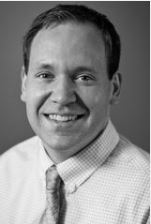
During a typical visit to the Les Turner ALS Center at Northwestern Medicine, people living with ALS meet with several members of their care team. From neurologists and genetic counselors to occupational therapists and dieticians, our clinicians at the Lois Insolia ALS Clinic work in harmony to provide the best individualized care.
Team members like Colin Franz, MD, PhD, Assistant Professor of Physical Medicine and Rehabilitation and Neurology, knows physiatry, his area of expertise, is just one part of a larger, comprehensive model. We interviewed Dr. Franz to learn more about his work and role at the Lois Insolia ALS Clinic:
Tell us a bit about yourself!
I have three young children and a wife who I spend most of my free time with.
I love sports, especially basketball and baseball, so it’s awesome for me to live in great sports city like Chicago. I’m originally from Nova Scotia, Canada, so I don’t pick a side in the local White Sox versus Cubs rivalry.
A lot of people aren’t familiar with the field of Physiatry. Can you explain what it is?
A Physiatrist is a medical doctor trained in Physical Medicine and Rehabilitation. However, because Physiatry is a specialty not focused on a single organ system such as the brain (Neurology) or heart (Cardiology), it’s often poorly understood by the general public and even other health professionals. Similar to Neurology, Physiatry-trained physicians can sub-specialize in Neuromuscular Medicine and that’s exactly what I’ve done.
Why did you decide to focus your career on helping people living with ALS?
I first got involved in ALS research as I was finishing my PhD training at Dalhousie University in Canada. There was a fascinating seminar by Dr. Ronald Oppenheim from Wake Forest University on how his lab could block motor neuron degeneration in the ALS model mice but the mice still got weak and lost neuromuscular connections. I thought this really challenged the way most people thought of the disease at the time and it sparked me to learn more about ALS.
So you’re one of the few Physiatrists with ALS expertise in the country. What do you bring to people with ALS that is not widely available?
As a Neuromuscular Medicine fellowship-trained physician, I evaluate and manage patients with ALS and other neuromuscular diseases. Leveraging my background in Physiatry, I’m the first physician in the Lois Insolia ALS Clinic who is trained to perform a neuromuscular ultrasound. This tool has a variety of applications for our patients from evaluating causes of shoulder pain to assessing diaphragm muscle function.
I think excellent Physiatry care has always been available to our patients at the clinic through referrals in the past, but having a Physiatrist present in the clinic marks the beginning of a much stronger collaboration between the Neuromuscular Medicine program at Northwestern and the rehabilitation expertise at the Shirley Ryan AbilityLab. Our patients with ALS now have easier access to the latest technological advancements and research.
You mentioned the Shirley Ryan AbilityLab. You also work there and you direct a research lab. Can you tell us about that?
At the Shirley Ryan AbilityLab hospital we take care of patients with functional impairments caused by conditions ranging from stroke and spinal cord injury to cancer and limb amputations. We are probably most famous for our innovative research programs involving assistive technology and robotics over the past few decades.
I see patients with peripheral nerve injuries at the Shirley Ryan AbilityLab in a weekly clinic. When I’m not seeing patients, my major responsibility is running my research laboratory.
I am the Director of the Regenerative Neurorehabilitation Laboratory located in the Shirley Ryan AbilityLab. My lab is focused on precision rehabilitation strategies for patients with nerve injuries and ALS through the use of induced pluripotent stem cell technology. In particular, I am interested in how individual patient conditions can determine responsiveness to activity-based treatments, such as exercise and therapeutic electrical stimulation.
You’ve been a part of the ALS community for a long time now. What gives you hope?
It’s a combination of our incredibly brave patients together with creative thinkers like my mentor, Dr. Teepu Siddique, that give me the greatest hope a cure is on the horizon.



